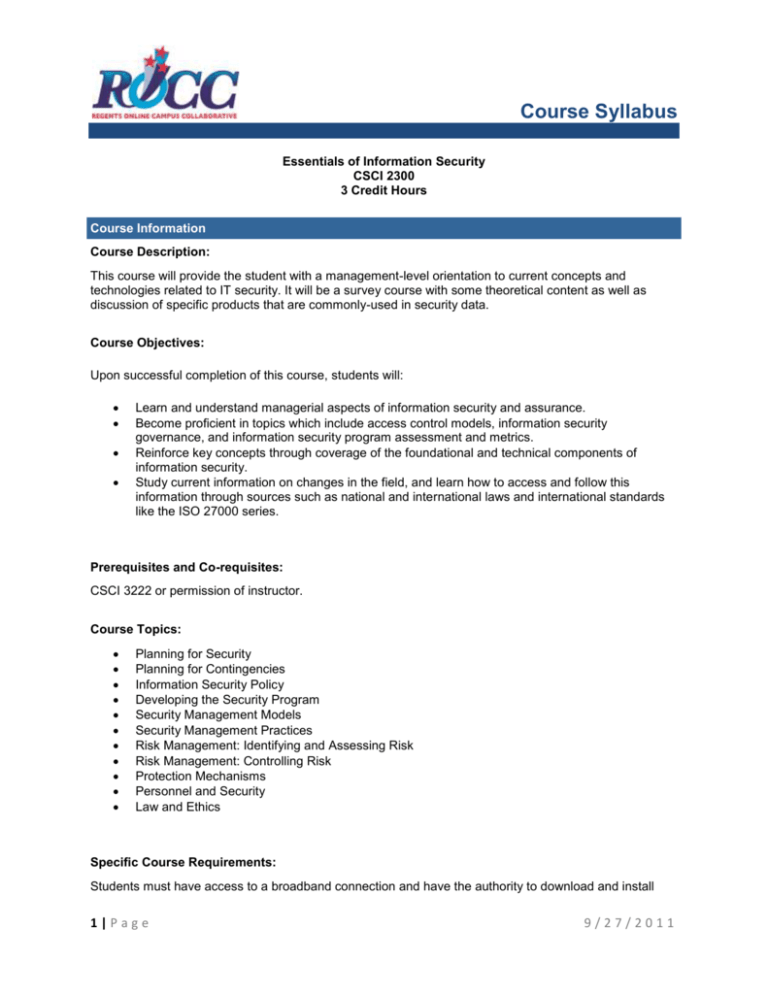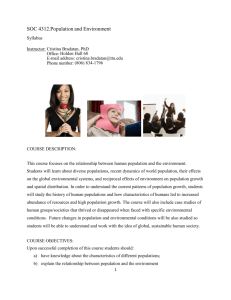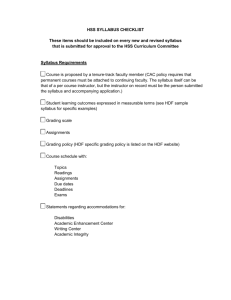Course Syllabus - Regents Online
advertisement

Course Syllabus Essentials of Information Security CSCI 2300 3 Credit Hours Course Information Course Description: This course will provide the student with a management-level orientation to current concepts and technologies related to IT security. It will be a survey course with some theoretical content as well as discussion of specific products that are commonly-used in security data. Course Objectives: Upon successful completion of this course, students will: Learn and understand managerial aspects of information security and assurance. Become proficient in topics which include access control models, information security governance, and information security program assessment and metrics. Reinforce key concepts through coverage of the foundational and technical components of information security. Study current information on changes in the field, and learn how to access and follow this information through sources such as national and international laws and international standards like the ISO 27000 series. Prerequisites and Co-requisites: CSCI 3222 or permission of instructor. Course Topics: Planning for Security Planning for Contingencies Information Security Policy Developing the Security Program Security Management Models Security Management Practices Risk Management: Identifying and Assessing Risk Risk Management: Controlling Risk Protection Mechanisms Personnel and Security Law and Ethics Specific Course Requirements: Students must have access to a broadband connection and have the authority to download and install 1|Page 9/27/2011 Course Syllabus software on a machine that will be used to work the exercises in this course (administrative rights on a machine are required). Textbooks, Supplementary Materials, Hardware and Software Requirements Required Textbooks: Please visit the Virtual Bookstore to obtain textbook information for this course: http://rodp.bkstr.com Supplementary Materials: None Hardware Requirements: The minimum requirements can be found at http://www.tn.regentsdegrees.org/students/hardware_software.htm. Software Requirements: The minimum requirements can be found at http://www.tn.regentsdegrees.org/students/hardware_software.htm. Instructor Information Please see the separate page inside the course to find instructor contact information as well as a statement of virtual office hours and other communication information. Assessment and Grading Testing / Grading Procedures: Testing Procedures: Both examinations will be administered during the designated exam period. The mid-term and final exams are not proctored. The exams can be taken at the student’s convenience during that time from any computer with an internet connection. The exams will be up to 1 hour in duration, and will be open book and open notes. This process is subject to change dependent on the prevailing procedures at the time of the examinations. Grading Procedures: Assignments will be graded on the basis of correctness, completeness, relevance and where applicable, ease of use and efficiency of design. A complete and correct answer accommodates all requirements specified in the assignment in a manner that is acceptable and workable in the designated environment. Your grade will be based on the weighted average of points derived from each module. The total number of points depends on the number of assignments. Your grade will be calculated using the following percentages Class Participation (6 assignments – 1.5% each): Homework (6 Assignments – 4% each): Labs (4 assignments – 3% each) Quizzes (10 assessments – 2% each) 2|Page 9% 24% 12% 20% 9/27/2011 Course Syllabus Project (1 project) Mid-Term Final 5% 15% 15% Grading Scale: Grade Percent Quality Points A 90-100 4.0 B 80-89 3.0 C 70-79 2.0 D 60-69 1.0 F 0-59 0.0 Assignments and Participation Assignments and Projects: Class Participation: You will need to login to the course several times per week to check for updated emails, announcements and other items related to your assignments. You are responsible for checking the content of each assignment for updates and/or changes during the week that it is due. If you download all assignments at the beginning of the semester, please doublecheck the assignment online to be sure it has not changed before working through the material. Punctuality: There is no make-up for quizzes or discussions. You may turn in homework and lab assignments up to 2 days late with a 20% penalty. The late assignments will have their own dropbox. Course Ground Rules The following two statements (1., 2.) were derived from the TBR System wide Student Rules document, released January 2012: RULES OF THE TENNESSEE BOARD OF REGENTS STATE UNIVERSITY AND COMMUNITY COLLEGE SYSTEM OF TENNESSEE SYSTEMWIDE STUDENT RULES CHAPTER 0240-02-03 STUDENT CONDUCT AND DISCIPLINARY SANCTIONS Read the document in its entirety here. 3|Page 9/27/2011 Course Syllabus 1. Standards of Conduct: Students are required to adhere to the same professional, legal and ethical standards of conduct online as on campus. In addition, students should conform to generally accepted standards of "netiquette" while sending e-mail, posting comments to the discussion board, and while participating in other means of communicating online. Specifically, students should refrain from inappropriate and/or offensive language, comments and actions. 2. Academic Integrity/Academic Honesty: In their academic activities, students are expected to maintain high standards of honesty and integrity. Academic dishonesty is prohibited. Such conduct includes, but is not limited to: o o o an attempt by one or more students to use unauthorized information in the taking of an exam, to submit as one's own work, themes, reports, drawings, laboratory notes, computer programs, or other products prepared by another person, or to knowingly assist another student in obtaining or using unauthorized materials. Plagiarism, cheating, and other forms of academic dishonesty are prohibited. Read more about How to Avoid Plagiarism. Students guilty of academic misconduct, either directly or indirectly through participation or assistance, are subject to disciplinary action through the regular procedures of the student’s home institution. Start here to find your institution's policy on student conduct. In addition to other possible disciplinary sanctions that may be imposed, the instructor has the authority to assign an "F" or zero for an activity or to assign an "F" for the course. 1. Standards of Conduct: Students are required to adhere to the same professional, legal and ethical standards of conduct online as on campus. In addition, students should conform to generally accepted standards of "netiquette" while sending e-mail, posting comments to the discussion board, and while participating in other means of communicating online. Specifically, students should refrain from inappropriate and/or offensive language, comments and actions. 2. Academic Integrity/Academic Honesty: In their academic activities, students are expected to maintain high standards of honesty and integrity. Academic dishonesty is prohibited. Such conduct includes, but is not limited to: o 4|Page an attempt by one or more students to use unauthorized information in the taking of an exam, 9/27/2011 Course Syllabus o o to submit as one's own work, themes, reports, drawings, laboratory notes, computer programs, or other products prepared by another person, or to knowingly assist another student in obtaining or using unauthorized materials. Plagiarism, cheating, and other forms of academic dishonesty are prohibited. Read more about How to Avoid Plagiarism. Students guilty of academic misconduct, either directly or indirectly through participation or assistance, are subject to disciplinary action through the regular procedures of the student’s home institution. Start here to find your institution's policy on student conduct. In addition to other possible disciplinary sanctions that may be imposed, the instructor has the authority to assign an "F" or zero for an activity or to assign an "F" for the course. Other Course Rules: Students are expected to: Participate in all aspects of the course Communicate with other students Learn how to navigate in D2L Keep abreast of course announcements Use the assigned course management (D2L) e-mail address rather than a personal e-mail address Address technical problems immediately: RODP Tech Support Web site. See also: Search Answers/Ask a Question (requires login) Observe course netiquette at all times Late Policy: Some assignments may be accepted up to 2 days late. There will be a 20% penalty for work turned in late. If there is a late dropbox for the assignment, then it will be accepted late. If there is no late dropbox, then the assignment may not be turned in late. Guidelines for Communications Email: Always include a subject line. Remember without facial expressions some comments may be taken the wrong way. Be careful in wording your emails. Use of emoticons might be helpful in some cases. Use standard fonts. Do not send large attachments without permission. Special formatting such as centering, audio messages, tables, html, etc. should be avoided unless necessary to complete an assignment or other communication. Respect the privacy of other class members 5|Page 9/27/2011 Course Syllabus Discussion Groups: Review the discussion threads thoroughly before entering the discussion. Be a lurker then a discussant. Try to maintain threads by using the "Reply" button rather starting a new topic. Do not make insulting or inflammatory statements to other members of the discussion group. Be respectful of others ideas. Be patient and read the comments of other group members thoroughly before entering your remarks. Be cooperative with group leaders in completing assigned tasks. Be positive and constructive in group discussions. Respond in a thoughtful and timely manner. More information is available in this link to discussion guidelines. Chat: Chat is seldom used in RODP. If for some reason it is opened: Introduce yourself to the other learners in the chat session. Be polite. Choose your words carefully. Do not use derogatory statements. Be concise in responding to others in the chat session. Be prepared to open the chat session at the scheduled time. Be constructive in your comments and suggestion Web Resources: Columbia Guide to Online Style by Janice R. Walker and Todd Taylor Citation Styles Online http://www.bedfordstmartins.com/online/cite6.html Library The Tennessee Virtual Library is available to all students enrolled in the Regents Degree Program. Links to library materials (such as electronic journals, databases, interlibrary loans, digital reserves, dictionaries, encyclopedias, maps, and librarian support) and Internet resources needed by learners to complete online assignments and as background reading must be included in all courses. Plagiarism What is Plagiarism? Plagiarism is representing someone else's intellectual property as your own. You put yourself at risk of plagiarizing when you fail to adequately cite the original source material from which you took words and ideas. Students With Disabilities Qualified students with disabilities will be provided reasonable and necessary academic accommodations if determined eligible by the appropriate disability services staff at their home institution. Prior to granting disability accommodations in this course, the instructor must receive written verification of a student's eligibility for specific accommodations from the disability services staff at the home institution. It is the 6|Page 9/27/2011 Course Syllabus student's responsibility to initiate contact with their home institution's disability services staff and to follow the established procedures for having the accommodation notice sent to the instructor. Syllabus Changes The instructor reserves the right to make changes as necessary to this syllabus. If changes are necessitated during the term of the course, the instructor will immediately notify students of such changes both by individual email communication and posting both notification and nature of change(s) on the course bulletin board. Technical Support Telephone Support: AskRODP Help Desk (toll free number 1-866-550-7637) or go to the AskRODP website at: http://help.rodp.org/ If you are having problems: logging into your course timing out of your course "technical" related issues for D2L (it takes a long time to click around my course) using your course web site tools If you contact Technical Support by phone please be at your computer and be prepared to provide the following information: (If you do not know the information below please call 1-866-550-7637) Your username Your password The URL, (address, "http://...") you are unable to access Your instructor's name (Ex.: Dr. Charles Cooper) Your course number, section and name (EX: EDU 1120 Introduction to Teaching) Are you using a PC or MAC Your operating system (Windows 98, NT, 2000, Vista, etc.) Browser type and version (EX: Internet Explorer 7) 7|Page 9/27/2011









